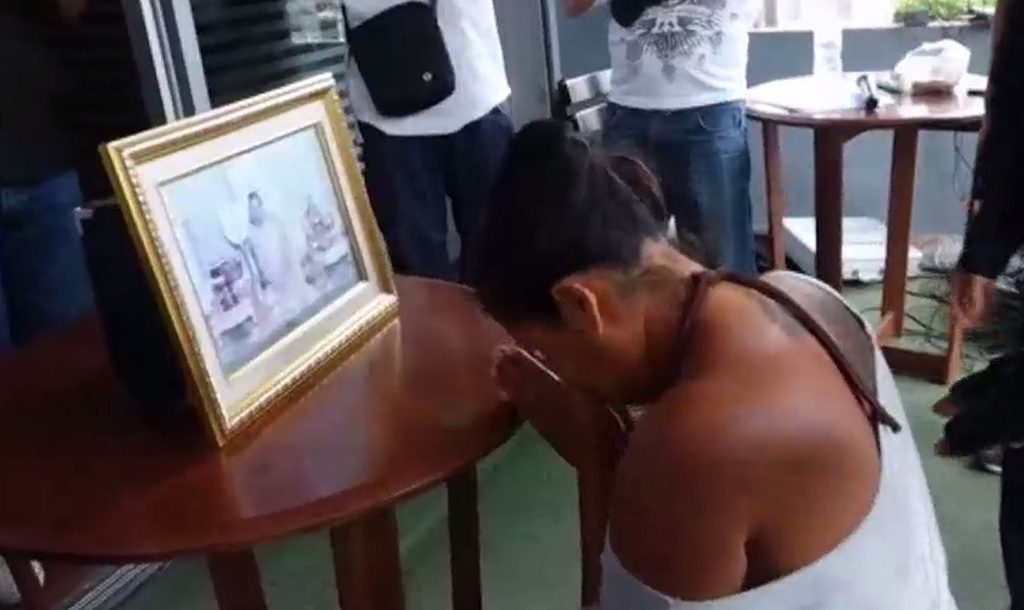Narisara Viwatchara is a Thai charged with lese majeste. Here she explains why her fellow citizens are quick to attack those who dare question Thailand’s monarchy.
As a result of the King Bhumibol Adulyadej’s death on 13 October, Thailand’s “Big Brother” mentality has heightened.
Ultra-monarchists are watching over everyone’s behaviour and scrutinising their conversations to determine if they may constitute lese majeste. In this environment, mob rule prevails.
Immediately after the passing of King Bhumibol, there were remarkable mass outpourings of grief from black-clad Thai people. This has also unleashed a small but vocal force of extreme monarchists, including online scouts scouring the Internet to punish anyone perceived to have insulted the King and his family.
On 15 October, Mai Phakaporn, a middle-aged woman was slapped by a female ultra-monarchist after she got off a bus in Bangkok – in front of an uniformed police officer who did nothing to help her or to arrest the perpetrator of this assault. She was alleged to have defamed the monarchy in the bus and was overheard by her attacker. It was later revealed that the 55-year-old was mentally ill.
On 16 October, a video, live-streamed to Facebook, showed a royalist mob kicking and beating a man and forcing him to prostrate in front of King Bhumibol’s photo and make an apology for allegedly insulting the monarchy online.
During the beating, which took place in Chonburi east of Bangkok, the man was forced to yell out: “I didn’t mean to do it, I love the King! It’s my fault.” His employer admitted to giving the man’s address to vigilantes.
On 17 October, a woman accused of insulting the heir-apparent, the Crown Prince Maha Vajiralongkorn, was publicly intimidated, hit, humiliated and forced to grovel beneath a portrait of Bhumibol in a suburb of Bangkok. The 43-year-old, Umaporn Sarasat, was jeered by a crowd of 500 angry monarchists as she prostrated in front of the late King’s image.
The cult-like frenzy of crying, and beating of non-royalist or anti-monarchists Thais in the wake of their beloved King Bhumibol’s death is a result of long term indoctrination. This ‘programming’ comes down to three key factors.
First, is the country’s strict lese majeste law, or Article 112. The laws protect the most senior members of Thailand’s royal family from insult or threat.
Article 112 of Thailand’s criminal code says anyone who “defames, insults or threatens the king, the queen, the heir-apparent or the regent” will be punished with up to 15 years in prison.
This has remained virtually unchanged since the creation of the country’s first criminal code in 1908, although the penalty was toughened in 1976.
The ruling has also been enshrined in all of Thailand’s recent constitutions, which state: “The King shall be enthroned in a position of revered worship and shall not be violated. No person shall expose the King to any sort of accusation or action.”
In other words, one can only praise the royal family. Any slight hint of negativity will result in lese majeste and jail terms. Indeed, hundreds of lese mejeste prisoners are scattered throughout the kingdom. And there are many who have fled overseas – I am one of them.
This strict law not only prevents open discussion, but forces Thai people to live in strict reverence of the royals, and bow down in unquestionable obedience.
The second, is that for much of his reign King Bhumibol was a mystical figure.
Ever since the untimely death of his elder brother, King Ananda, the young Prince Bhumibol became reclusive and rarely gave interviews. He was also rarely seen in public, except to deliver the sporadic New Year or birthday speech.
In the main, his subjects did not truly know him or what he was truly thinking. Indeed, he behaved in a way that seemed a lot more like an aloof god or detached demi-god than a monarch, or ‘loving father of the nation’, as so many quick to cliché call him.
However, there were periods, earlier in his reign, when he did connect with his subjects – meeting them in the country’s fields where he dispensed development largesse and his wisdom.
But by the end of the 20th century and start of the 21st, Thais have mainly seen a king who was shrouded by sickness, ensconced by elites, and tacitly approving of coups that were the salt in the wounds of the people’s overturned democratic desires.
Third, is the yearly promotional budget from taxpayers’ money, which is used to positively portray the royal family publically. Thailand’s ruling junta has significantly increased the budget of this well-oiled PR machine – allocating up to 18 billion baht, or around $US 513 million.
This massive sum of money is used to pay for news and publicity material about the royal family and the monarchy across television and radio stations throughout the day, seven days a week.
In addition, the budget provides for the publication of teetering piles of promotional booklets for children in elementary and high school. The huge posters of the king hanging in all major street corners also come from this find. All this propaganda, is paid for by the people.
Which raises the question; is the monarchy loved from true adoration, or is adoration merely the product of advertising?
Narisara Viwatchara was charged with lese majeste in 2009 for posting an article about the royal couple in an Internet chat room. A warrant for her arrest was issued. She was alerted and fled to the United States, where she now lives and works.
 Facebook
Facebook  Twitter
Twitter  Soundcloud
Soundcloud  Youtube
Youtube  Rss
Rss 